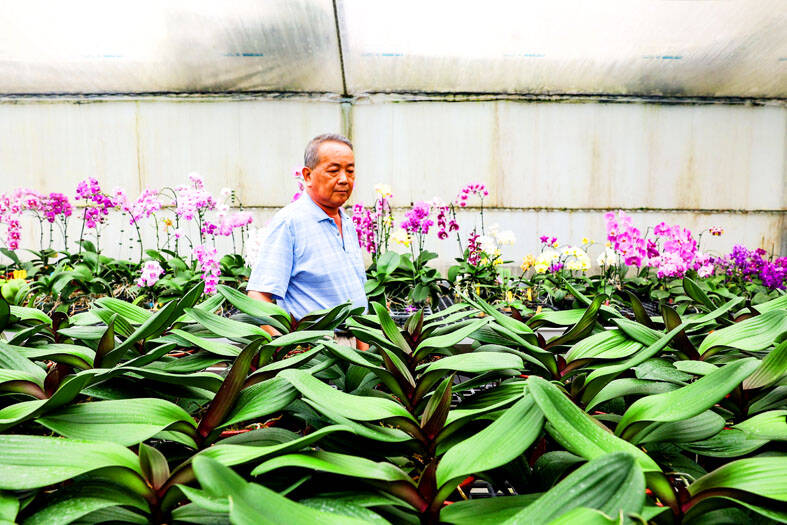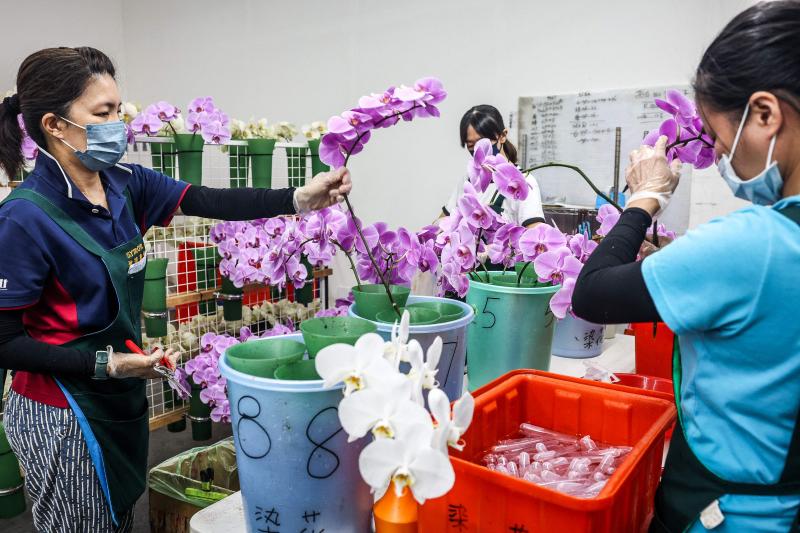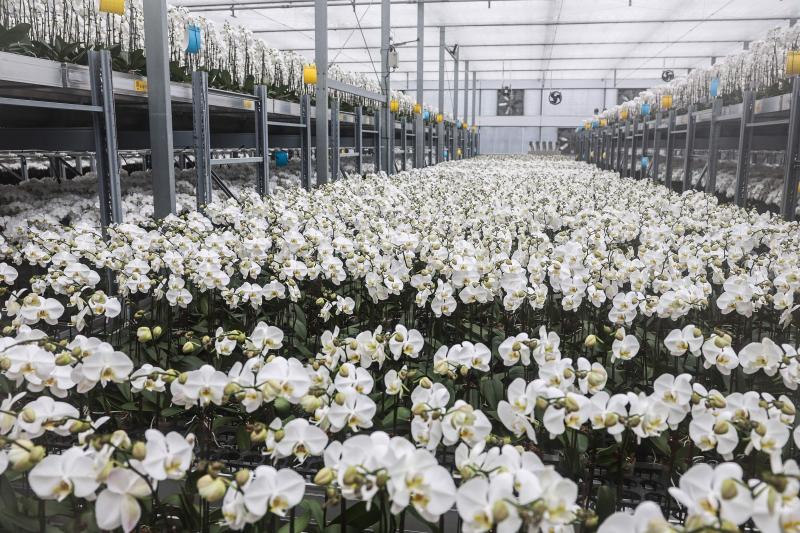Since the start of US President Donald Trump’s global trade war, Taiwanese orchid-grower Lee Tsang-yu (李蒼裕) has watched tariffs on his seedlings shoot from nothing to 20 percent.
After weathering many economic crises, the 61-year-old seasoned farmer is digging in.
Lee is cultivating new markets in Thailand, and expanding in Vietnam, Indonesia and Brazil, while cutting back shipments to the US.

Photo: Cheng I-hwa, AFP
“The US is such a huge market, we can’t pull out and we won’t,” said Lee, whose company, Charming Agriculture Co (鮮明農業), operates four rugby field-sized greenhouses in Tainan’s Houbi District (後壁).
Taiwan’s more than 300 orchid growers rank among the world’s biggest producers of the thick-leaved plants, with Phalaenopsis orchids, also known as moth orchids, dominating exports.
The nation’s orchid shipments reached NT$6.1 billion (US$203.4 million) last year, with about NT$2 billion of plants sent to the US, its biggest market, official data showed.

Photo: Cheng I-hwa, AFP
Until now, most growers have been absorbing the cost of the 10 percent tariff that Trump slapped on nearly every trading partner in April, said Ahby Tseng (曾俊弼), 53, secretary-general of the Taiwan Orchid Growers’ Association (台灣蘭協).
However, “no one can bear” all of Trump’s temporary 20 percent levy on Taiwan announced last week, he said.
Tseng said Taiwan’s main rival in the US is the Netherlands, which has been hit with a relatively lighter 15 percent tariff.

Photo: Cheng I-Hwa, AFP
The 5 percentage point difference is significant, he said.
“It is actually very difficult to immediately pass the cost on to consumers, because consumers can choose not to buy, or they can choose to buy other types of flowers,” Tseng said.
Stockpiling orchids in a warehouse is not an option given that the plants “keep growing,” he said.
While the higher tariff would erode his bottom line, Lee said he was more concerned about the general state of the US economy since Trump took office.
“Everything has become more expensive in the US and consumer spending is shrinking — that’s what worries me,” he said. “Since late May, we’ve already cut shipments by 15 percent. Before that, the US accounted for 45 percent of our exports.”
Lee said he was optimistic his efforts to expand into other markets, although slow and not always as lucrative, would “gradually offset this impact.”
Taiwan’s orchids also had a competitive edge, he said — their flowers last longer than Dutch plants.
And, he reasoned: “Trump won’t be president forever.”

On Tuesday, US President Donald Trump weighed in on a pressing national issue: The rebranding of a restaurant chain. Last week, Cracker Barrel, a Tennessee company whose nationwide locations lean heavily on a cozy, old-timey aesthetic — “rocking chairs on the porch, a warm fire in the hearth, peg games on the table” — announced it was updating its logo. Uncle Herschel, the man who once appeared next to the letters with a barrel, was gone. It sparked ire on the right, with Donald Trump Jr leading a charge against the rebranding: “WTF is wrong with Cracker Barrel?!” Later, Trump Sr weighed

SinoPac Financial Holdings Co (永豐金控) is weighing whether to add a life insurance business to its portfolio, but would tread cautiously after completing three acquisitions in quick succession, president Stanley Chu (朱士廷) said yesterday. “We are carefully considering whether life insurance should play a role in SinoPac’s business map,” Chu told reporters ahead of an earnings conference. “Our priority is to ensure the success of the deals we have already made, even though we are tracking some possible targets.” Local media have reported that Mercuries Life Insurance Co (三商美邦人壽), which is seeking buyers amid financial strains, has invited three financial

HEADWINDS: Upfront investment is unavoidable in the merger, but cost savings would materialize over time, TS Financial Holding Co president Welch Lin said TS Financial Holding Co (台新新光金控) said it would take about two years before the benefits of its merger with Shin Kong Financial Holding Co (新光金控) become evident, as the group prioritizes the consolidation of its major subsidiaries. “The group’s priority is to complete the consolidation of different subsidiaries,” Welch Lin (林維俊), president of the nation’s fourth-largest financial conglomerate by assets, told reporters during its first earnings briefing since the merger took effect on July 24. The asset management units are scheduled to merge in November, followed by life insurance in January next year and securities operations in April, Lin said. Banking integration,

Artificial intelligence (AI) chip designer Cambricon Technologies Corp (寒武紀科技) plunged almost 9 percent after warning investors about a doubling in its share price over just a month, a record gain that helped fuel a US$1 trillion Chinese market rally. Cambricon triggered the selloff with a Thursday filing in which it dispelled talk about nonexistent products in the pipeline, reminded investors it labors under US sanctions, and stressed the difficulties of ascending the technology ladder. The Shanghai-listed company’s stock dived by the most since April in early yesterday trading, while the market stood largely unchanged. The litany of warnings underscores growing scrutiny of